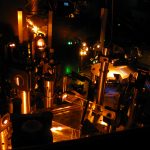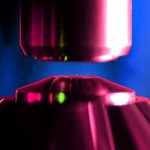Photonische und quantenmechanische Systeme
Die systematische Erzeugung, Detektion und Manipulation von Licht hat ein rasch wachsendes Forschungsgebiet eröffnet, das heute gemeinhin als Photonik bezeichnet wird. Dieses interdisziplinäre Gebiet ist sowohl mit der klassischen Optik als auch mit den modernen Gebieten der Quantenoptik und der Quantenoptomechanik eng verbunden. Während letztere vor allem der Grundlagenforschung zuzurechnen ist, war die Photonik von Anfang an ein angewandter Forschungszweig, wie ihr programmatischer Name schon sagt: Licht kann Dinge tun, die zuvor von der Elektronik erledigt wurden. Infolgedessen gehören viele ihrer Entwicklungen – beginnend mit der Erfindung des Lasers – heute zu den wesentlichen Werkzeugen und Bausteinen des wissenschaftlichen Fortschritts nicht nur in den optischen Wissenschaften und der Physik, sondern auch in der Biologie (z. B. optische Pinzetten) oder der Chemie (z. B. Laserspektroskopie und -kühlung, STED-Mikroskopie jenseits der Beugungsgrenze). Die Verfügbarkeit dieser Werkzeuge legte den Grundstein für anspruchsvolle Quantenexperimente, die noch vor wenigen Jahrzehnten unvorstellbar schienen. Heute, an der Schwelle zur so-genannten zweite Quantenrevolution, erleben wir den Übergang von Quantenwissenschaft zu Quantentechnologie. Die Forschungsgruppe Photonische und Quantensysteme widmet sich einerseits der Verbesserung und Erweiterung der Fähigkeiten photonischer Systeme und andererseits der Entwicklung zukünftiger Quantentechnologien, indem sie Methoden der mathematischen Modellierung, Systemanalyse, Optimierung und Kontrolltheorie einsetzt.
Ausgewählte Projekt

Regelungsstrategien für hoch-energetische gepulste Laserquellen
Hochenergetische Laserpulse sind zu einem wertvollen und flexiblen Werkzeug mit Anwendungen von physikalischer und chemischer Grundlagenforschung bis hin zur ablationsbasierten Materialbearbeitung geworden. Ziel unserer Forschungsarbeit ist es, die Leistungsfähigkeit und Flexibilität moderner Laserquellen durch regelungstechnische und systemtheoretische Methoden zu erhöhen. Weiterlesen →

Regelungsstrategien für Quantenfelder2022 - 2025
Die Hauptmotivation dieses Projekts ist die Entwicklung von Regelungs- und Steuerungsalgorithmen, die Operationen zur Quantensimulation für Experimente mit ultrakalten Atomen mit hinreichender Präzision ermöglichen. Insbesondere wollen wir algorithmische Werkzeuge für zwei unterschiedliche physikalische Situationen entwickeln: mikroskopische thermische Maschinen auf Quantenfeldern und das gezielte, kohärente Aufspalten von Bosegasen. Weiterlesen →

Regelung von Quantenzuständen für levitierte Teilchen2023 - 2025
Ziel dieses Forschungsprojekts ist die Erzeugung von bewegten Quantenzuständen mesoskopischer, optisch levitierter Teilchen durch Methoden der Regelungstheorie und echtzeitfähigen Algorithmen. Durch ihre unübertroffene Empfindlichkeit haben levitierte Nanopartikel eine Vielzahl von möglichen Anwendungsgebieten - von der Erforschung dunkler Materie bis hin zu kommerziellen Sensoranwendungen. Weiterlesen →